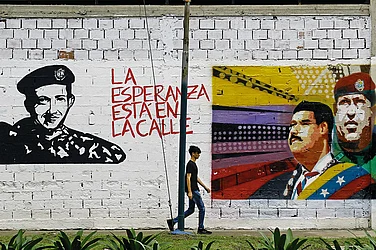The Russian military reported Monday that it shot down a Ukrainian drone approaching an air base deep inside Russia, the second time the facility has been targeted this month — again revealing weaknesses in Russia's air defenses.
Russia's Defense Ministry said debris killed three servicemen at the Engels air base, which houses Tu-95 and Tu-160 nuclear-capable strategic bomber planes that have struck Ukraine with missiles in the 10-month-old war.
Russia's Baza news outlet reported that four people were wounded and said a fire had broken out, with explosions, sirens and flashes on a video it posted on its Telegram channel. The Defense Ministry claimed no Russian aircraft were damaged. It wasn't clear whether the drone had been launched from Ukraine or Russian territory.
If the drone had been launched from Ukraine, it would have traveled more than 600 kilometers (370 miles) to reach Engels, located in Russia's Saratov region on the Volga River. Shooting the drone down after such a long trip inside Russia again raises questions about the effectiveness of Russia's air defenses, particularly those intended to protect its most strategic military assets such as warplanes capable of carrying nuclear weapons.
In keeping with the Kyiv government's long-standing practice of not confirming cross-border attacks but welcoming their results, Ukrainian air force spokesperson Yurii Ihnat didn't directly acknowledge his country's involvement in Monday's incident in an interview on Ukrainian television, but said: "These are the consequences of Russian aggression."
He added: "If the Russians thought that the war wouldn't affect them deep behind their lines, they were deeply mistaken."
Russia has suffered numerous cross-border attacks during the war on its main territory, as well as on the Crimean Peninsula, which it illegally annexed in 2014. The incidents have outraged Russian military bloggers who say they show the country's weak air defenses and security systems in general.
In another cross-border incident that couldn't be independently confirmed, Russia's Tass news agency reported Monday that the country's security forces had killed four Ukrainian saboteurs attempting to enter the Bryansk region from Ukraine. The report claimed the infiltrators carried explosive materials when they were caught Sunday.
The cross-border attacks on Russian military and other strategic sites prompted Russian President Vladimir Putin to order almost weekly missile and weaponized drone attacks on Ukraine's energy infrastructure, causing widespread blackouts that also knocked out heating and water supplies in increasingly frigid weather. The attacks, which began in October across much of the country, have been occurring as ground fighting focused on Ukraine's southern and eastern regions.
In eastern Ukraine on Monday, Luhansk's Ukrainian governor, Serhiy Haidai, said Russian forces have withdrawn from their military command operations post in the town of Kreminna as Ukrainian forces were approaching after months of intense fighting. Russia's Defense Ministry didn't comment on the withdrawal claim.
Russian forces relocated to Kreminna and several other areas in September after they pulled back from the Kharkiv region in eastern Ukraine.
Kreminna is in the eastern Luhansk region, which is almost entirely under Moscow's control, and is on an important supply route for Russian forces and serves as a gateway for movement into other strategic positions.
Earlier, Haidai reported that Russia had withdrawn its occupying government administration from Svatove, 51 kilometers north of Kreminna.
President Volodymyr Zelenskyy said in his nightly video address Monday that "the situation there is difficult, painful. The occupiers are expending all the resources available to them — and they are considerable resources — to squeeze out at least some advance."
Haidai told Ukrainian television on Monday that Russian forces in the region are "suffering huge losses and medical facilities are overwhelmed with wounded soldiers." The Russian army is redeploying paratroopers from the Kherson region to the area, he added.
In neighbouring Donetsk region, partially occupied by Russia, fierce battles continue around the city of Bakhmut, which Russian forces have been trying to seize for weeks to consolidate their grip on Ukraine's east. Zelenskyy said last week Bakhmut was the hottest spot on the war's 1,300-kilometre front line.
Ukrainian officials have maintained ambiguity over previous high-profile attacks, including drone strikes on Russian military bases earlier this month.
On Dec. 5, unprecedented drone strikes on Engels and the Dyagilevo base in the Ryazan region in western Russia killed a total of three servicemen and wounded four others. In retaliation, Russia launched a massive missile barrage in Ukraine that struck homes and buildings and killed civilians.
Elsewhere on the battlefield, at least four civilians were wounded in Russian shelling of five Ukrainian southeast regions over the past 24 hours, according to the deputy head of Ukraine's presidential office, Kyrylo Tymoshenko. Overall, the intensity of the shelling from Sunday night into Monday was significantly lower.
For the first time in weeks, Russian forces didn't shell the Dnipropetrovsk region, which borders the partially occupied southern regions of Kherson and Zaporizhzhia, its governor, Valentyn Reznichenko, reported on Telegram.
"This is the third quiet night in 5.5 months since the Russians started shelling" the areas around the city of Nikopol, Reznichenko wrote. Nikopol is located across the Dnieper River from the Zaporizhzhia nuclear power plant, which is under the control of Russian forces and whose six reactors are shut down.
Ukrainian-controlled areas of the neighboring Kherson region were shelled 33 times over the past 24 hours, according to Kherson's Ukrainian Gov. Yaroslav Yanushevich. No casualties were reported.
On Sunday, Russian forces attacked the city of Kramatorsk, where Ukrainian forces are headquartered. Three missiles hit an industrial facility and damaged residential buildings, but no casualties were reported, according to local officials.
On Saturday, a deadly attack on the city of Kherson, which Kyiv's forces recaptured last month, killed and wounded scores of people. Local residents are lining up to donate blood for the wounded, Yanushevich said Monday.





















